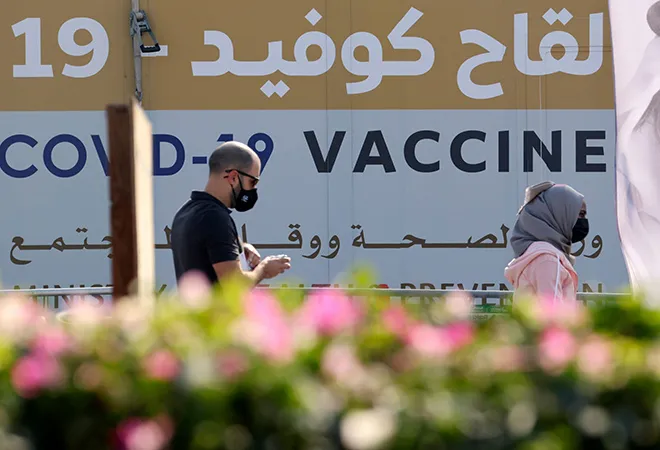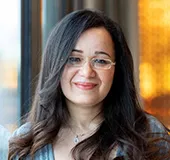-
CENTRES
Progammes & Centres
Location

This article is part of the series — 2021: The Year of Vaccines.
A year after the World Health Organisation (WHO) declared COVID-19 a pandemic, the entire globe is still reeling from its impact on economies, communities, and the healthcare sector. Almost every household has been impacted directly or indirectly, thereby, leading to changes in behaviours, habits, and our most basic daily activities. Each government handled the response to the pandemic differently, with some being hailed for their prompt response and others being criticised for ‘fumbling through’.
Early on, the United Arab Emirates (UAE) was recognised for its disciplined response in putting the safety of its citizens and residents first, and in managing its healthcare services and resources in an efficient manner to best deal with the quickly-developing situation. As the pandemic progressed, the focus shifted from managing the effects of the pandemic to vaccinating the population against COVID-19. UAE took substantial steps to help its residents to navigate this shift from COVID-19 response to vaccine acceptance and uptake.
This has led to 2021 being informally coined “the year of the vaccine”.
Locations of vaccine centres across the UAE first appeared on the official portals of the Ministry of Health and Prevention (MOHAP) on January 4th, with the first publically-administered vaccinations recorded on January 5th. The UAE had been involved in Phase III trials of the Sinopharm vaccine since July 2020 on 31,000 volunteers, and administered the first vaccine to select individuals in the healthcare sector in September 2020. This was coupled with a live streaming session with Dr Laila Al Jasmi, Head of the Immunisation Section, titled “The Major Information about COVID-19 Vaccine”. The National Vaccination Drive, which remains voluntary todate, was underlined by the hashtag #TogetherWeRecover, encompassing the essence of the government’s approach since the start of the pandemic of sharing the responsibility of prevention and safeguarding health with its community. By January 11th, select private hospitals were approved and announced as vaccination centres in an effort to meet the growing demands for the vaccines. In a statement at the end of January, the National Emergency Crisis and Disaster Management Authority (NCEMA) announced that “the UAE ranked 2nd in the world in daily doses last week”. They also announced their ambition to have 50 percent of the population vaccinated by the end of the first quarter of the year—a measure they are safely moving towards.
As on February 20th, the Supreme Council for National Security reported that 5,553,391 total vaccine doses have been administered in the UAE, which is equivalent to 56 percent of the population.
The UAE offers four different vaccines to its residents and citizens free of charge, and on a voluntary basis: Sinopharm, Pfizer-BioNTech, Sputnik V, and the latest by Oxford-AstraZeneca. There are about 170 vaccination centres across the UAE, covering the seven emirates. Early on, the vaccination centres experienced high levels of footfall which was expertly managed to ensure safety for visitors and ease of access, giving priority to the elderly and people of determination. While centres began accepting visitors on a walk-in basis, with the increase in traffic, the operating times of the vaccine centres were increased and residents were encouraged to take appointments prior to visiting the centres. All the centres were set up to ensure all precautionary measures were strictly adhered to and the flow of entry and exit was managed carefully. Vaccinations were administered after each resident’s blood pressure was measures and after they answered the pre-vaccination questions by the medical staff, to ensure eligibility and safety. Residents walked away with a ‘vaccination card’ with their name, ID number, vaccination date, type and dose, and a frequently asked questions document (FAQ) to help them understand and deal with any side effects that they may experience in the first few days after the vaccination. It also included easy-to-access contacts for emergency questions that they may have thereafter, including a help-line and email id.
True to its form, the UAE government was keen on ensuring that its diverse community of residents has all the relevant information readily available to them, from reliable sources, at the click of a button. They leveraged their advanced technological foundation through numerous websites and apps, covering information, bookings, and follow-up. These sites provide FAQs in several languages, including English, Arabic, Urdu, Filipino, and Mandarin, reflecting the diversity of the residents. They also leveraged the full portfolio of media channels to disseminate information to the people, keeping COVID-19 updates regular and top of mind, covering new cases, recovered cases, and death tolls, as well as numbers of vaccinations received and administered.
Building on experience, the levers of success of the vaccination drive in the UAE could be attributed to its diligence on a unified national approach, careful dissemination of reliable information and the efficient use of technological platforms to ensure that the community is seamlessly connected to the information sources to enable them to take informed decisions. NCEMA and MOHAP remain the primary sources of medical information and strategic crisis direction at a federal level, supported by the regional health authorities such as Dubai Health Authority (DHA), the various departments of health and several dedicated easy-to-use applications such as Al Hosn App. It is important to note that residents find the same, necessary information from reliable sources regardless of the site or app they resort to use.
On a lighter note, the vaccination drive provided a welcome opportunity for business owners to support the initiative through various marketing campaigns giving special discounts to people who have been inoculated—ranging from discounts for hotel stays and dining experiences to rides from vaccination centers, driving classes, and even free coffee.
The views expressed above belong to the author(s). ORF research and analyses now available on Telegram! Click here to access our curated content — blogs, longforms and interviews.

A specialist in the communications with over 20 years experience in multinational &: regional companies across the Middle East North Africa (MENA) region Mai has ...
Read More +